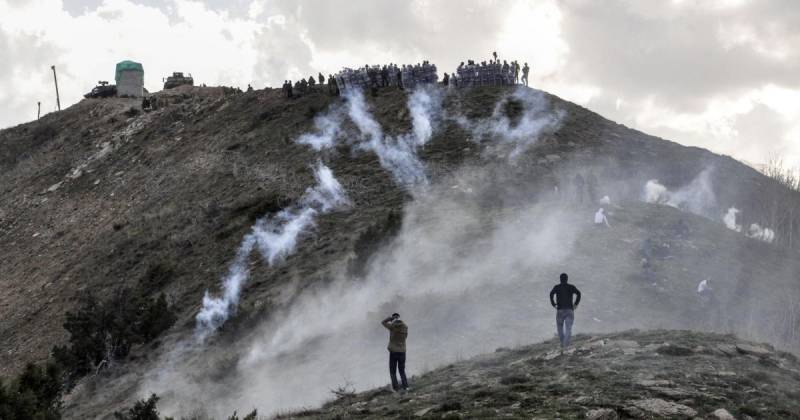Devastating forest fires, sparked by military operations, have raged for two months in Dersim, a Kurdish province in eastern Turkey.
Officially named Tunceli, Dersim is populated by Alevi Kurds and was the scene of a brutal massacre carried out by security forces in 1938 in which tens of thousands were killed and displaced. The city of Dersim is surrounded by towering mountains and thick forests.
When the forest fires broke out in Aliboğazı area of Dersim in July, neither the Tunceli provincial governor, nor the forestry authority, nor any other official body did anything to put out the flames. Volunteers and local environmental organisations worked hard to control the fire that lasted weeks.
New forest fires broke out in Dersim in August as military operations continued. Fires that started in Pülümür, Hozat, Nazmiye, and Ovacık districts destroyed thousands of hectares of forest and killed wildlife. Efforts by activists and members of the public in the region to intervene were blocked by authorities citing security concerns. But the authorities were not concerned about fire safety. A number of activists and local environmental organisations made a joint statement demanding authorities put out the fire, but nothing changed. People who talked about the issue, or posted on social media, or attempted to inform the public about the fires were accused of supporting terrorists! A classic Turkish case!
There are fires in many rural areas every summer because of military operations against Kurdistan Workers’ Party (PKK) militants active in the mountains in the mainly Kurdish southeast of Turkey. Cudi, a famous mountain in rural Kurdistan and Lice, a rural district of my hometown Diyarbakır, have lost many plants and wild animals in the last number of years because of the fires caused by military operations.
Murat Çepni, a member of parliament for the pro-Kurdish opposition Peoples’ Democratic Party (HDP), said last week the fires were a constitutional crime. He said more than 90 fires had broken out in 33 districts between July 16 and 23, but fires in the Kurdish region were overlooked by the media. There has been no coverage in international media.
In the last 34 years of war with the PKK, the Turkish state has plundered the Kurdish geography; forests have been burnt and rivers have been spoiled. Chemical weapons have led to serious illnesses. The environmentalists of Dersim I interviewed four years ago for my book “Civil Society in Kurdistan”, told me that due to the chemical weapons used by the state, the number of people who have cancer is higher in Dersim than other regions of Turkey.
It is clear that the state will continue to cause fires in the Kurdish region that it hates. I have nothing more to say to the Turkish state, I really have no expectations from this state. Today, I have a few words for the environmentalists, ecologists and civil society organisations in Turkey who have silently watched these fires.
The environmentalists, ecologists and civil society organisations in Turkey have been silent about these fires in the Kurdish region for the last 34 years. The famous environmental and ecological organisations of Turkey and also the international organisations with branches in Turkey are watching these fires. The life of the trees, bees, deer or birds are not important to these NGOs and environmentalists. These animals and trees have committed an unforgivable sin in the eyes of these NGOs and environmentalists by being part of the Kurdish ecology.
In Turkey civil society has already died, not only due to state pressure, but also because of hypocrisy. When it is about Kurds, their eyes, ears and mouths stay closed. They have chosen not to see the crimes of the state against the Kurdish people, Kurdish nature and the Kurdish geography.
During the military curfew in Silvan (Farqin in Kurdish), a young man was talking to the media:
“It is burning right next to us… The youths of Cizre are dying, the youths of Farqin are dying, the youths of Bismil are dying. Are they not worth anything? Today Farqin is standing up for everyone. But no one is standing up for Farqin. We will not forget this. We swear on the blood of our martyrs that we will not give up our struggle. Our sisters are dying today. Our brothers are dying today, our brothers. We are not even worth a tree today? For a tree in Istanbul everyone stood up. We have now been under the rain of bullets for seven days. There is nothing here. No bread, no food…
“Are we not human beings? Are we not even worth a tree?”
Unfortunately not! As Kurds we know, our life, the life of our animals and our trees are not worthy, not only in the eyes of the Turkish state, but also in the eyes of Turkish NGOs!
